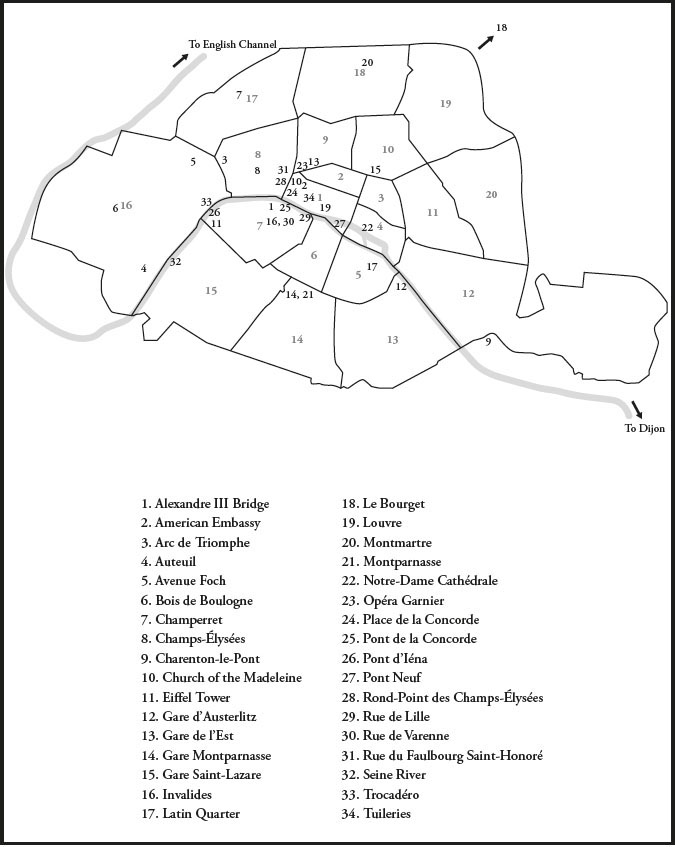
Paris with arrondissements
Introduction
Marie-Louise Dilkes worked for the American Embassy in Paris from 1933–1954. As the American Embassy receptionist, she experienced the chaotic times in Europe with the rise of Hitler and all that followed. While her career as a member of the Embassy staff spanned 21 years, her writing focused on the years 1939–1944. She wrote her manuscript, which she titled Paris Notes, in Paris in 1955.1
Marie-Louise began her Notes: “Monsieur Pierre Audiat2 has written in the preface of his interesting book Paris Pendant la Guerre3 that no one, no matter how learned he is or how great his intuition or imagination, is able to feel or evoke the atmosphere of Paris during the German Occupation unless he himself had breathed it. Even memory would not be adequate nor would material facts be sufficient.”
She wrote, “One must indeed have lived in occupied France during those eventful days to have felt and experienced that atmosphere. From the hearts and souls of the French, there was a surge of fierce passions, of strong emotions strongly controlled, and so often unhappily uncontrolled, as those great, bitter waters closed over them and their country. There were scorn, hatred, distrust, resentment, mockery, defiance and a sullen acceptance of the rules of Occupation as days moved into months and months into four long, unhappy years.”
While she endeavored to describe the atmosphere of Paris during the Occupation and to relate some of the facts of the war as they came into her experience, she did not focus on what made her contribution to this part of history so unique: her role as receptionist to the American Embassy in Paris during World War II. Using subtitles, I have extracted her experiences as a member of the Embassy staff, which drew out how much the Embassy impacted the lives of Americans, Parisians, and all who passed through the door to the American Embassy in Paris.
The writings of Marie-Louise Dilkes are very much a portrait of a woman born in the 1880s, 1886 to be exact, and who lived to experience the tragedies of two world wars. In her focus on detail, she emerges as a woman who was educated, elitist, and emotional. She enjoyed seeing France through the architecture that surrounded her and the writings through the ages that inspired her. She was well-read and often cited literature in her writing. Marie-Louise would quote from the Bible and from French, British, and American literature, especially poetry; from the classic or bestseller books of the times; and from American, French, Belgium, German, Italian, and Swiss newspapers.

Paris with arrondissements
She hobnobbed with the elite, from dukes and duchesses of the United Kingdom to European royalty to people of high position. Marie-Louise was comfortable among the elite since she was born into a family of privilege. The Dilkes family was a member of Main Line Philadelphia society. Her father, George R. Dilkes,4 had owned the Southern Steamship Lines5 in Philadelphia, Pennsylvania. She carried her privileged life and society friends to Paris and tried to live her life in France accordingly. The war interrupted her lifestyle, and she wrote about her frustrations. While she adjusted to the sparse war-time life, her thoughts never did. Throughout her writing the reader will recognize her elitist thoughts. Her society friends in turn sought her out because of her appointment at the American Embassy. Whether in social settings or at the Embassy, her friends often inquired of her if or when the U.S. was going to enter the war, whether she could offer visa advice, or how they could protect their assets. Her friends found her wherever her journey with the U.S. State Department took her.
She made no bones about her support for the Allies, especially the Americans, the French, and the British, and her hatred for the Nazis. She hated those who would destroy the France she loved. Her manuscript is filled with her thoughts on what the world should be or what she wished it could be. The engaged reader will not have a problem discerning Marie-Louise Dilkes’ thoughts and opinions from what is happening in the world around her.
Mary-Louise Dilkes is my aunt. I never met her. Readers first met her in the writing of Charles Edward Dilkes, her brother and my father, which related his experiences as a combat engineer in World War I in his book Remembering World War One: An Engineer’s Diary of the War. Marie-Louise and her brother were able to get together in Paris in April 1919 when he was on leave while serving with the U.S. Army of Occupation.
Through her World War II memoir, I have come to understand the love Marie-Louise had for America and France. Through her writing it was interesting to visit the places that were a part of her life—and then to research those places today. It would have been nice to have known my Aunt Marie-Louise. She was a woman of her times and one for the generations to come.
Virginia Dilkes, 2023